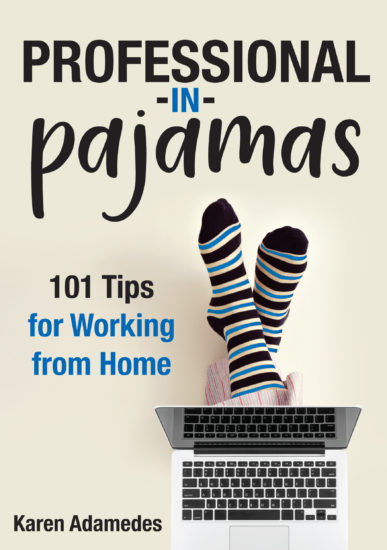by Karen Adamedes
A huge thank you to the many people who have contributed their stories and experiences about working from home to help me bring to life my new book Professional in Pajamas: 101 Tips for Working from Home.
I’ve been writing this for over a year, in between actually working from home. I could never have imagined that by the time I published the world would be turned on it’s head and so many of us would be working from home. All the time. (For now anyway. It would be better if it was out of choice.)
I’ll be regularly posting tips on the Career Tips to Go blog, Twitter, Facebook, LinkedIn – the usual places. And I hope they help you or someone you know.
In the book I talk about topics like how to be productive, keeping the balance between work and home, as well as how to stay in touch with others.
Today, I’d like to share with you the preface from the book to let you know the background to why I wrote it, the stuff that’s great about working from home and some of the common challenges:
Preface to Professional in Pajamas: 101 Tips for Working from Home
“I’ve worked from home for over a decade and have been writing this book for more than a year. That was back in the day when working from home was a choice, a privilege or for many a small business person, a necessity. Now due to COVID-19 it is mandatory for millions as a way of minimizing the spread of the virus and protecting ourselves and others.
We have a new vocabulary that includes self-isolation, social distancing, lockdown, quarantine and stay-at-home orders. We are all a little bit scared as there are so many things that are out of our control (I’m sure it’s not just me!) The way we work and live is changing, for now, and we don’t know what the new normal will be on the other side of this pandemic.
There are those who are working from home for the first time, who are trying to figure out how to make it work. Like how do you have a professional work conversation when you have children fighting over the remote control in the next room? Or how do you stay connected with colleagues, customers or in fact any other human being if you live alone?
There are others who do work at home regularly or occasionally, who are now confined to their home with no escape to the office for some laughs, giggles or even a boring meeting (which now has some appeal!)
And then there are others, like me, who work at home full-time, who are adjusting to working with colleagues and customers who are now working differently (and calling a lot more often than they used to!) I have worked at home as both as an employee and as the Principal of my own consultancy business. I love setting my own routine, wearing whatever I feel comfortable in (as long as I don’t have a video conference), and being able to talk on the phone as loudly as I like.
My office has a huge print that brings color and life to my work space. I can grab my laptop and work from the garden or in front of the TV, whenever I choose. Sometimes I put on the occasional load of washing during the day, and feel virtuously organized, for a short time at least.
But there are downsides, too. There’s the absolute frustration when I have an IT problem, the irritation of the neighbor’s lawnmower starting up when I’m on a conference call, and sometimes, a ridiculous and illogical feeling of guilt when I go out for a coffee (although that is suspended for a while). Taking some time out is something I wouldn’t think twice about if I worked in an office. And then there is the issue of ‘not knowing when to call it quits and stop working’ because I can always find something else to do.
Through trial and error, and comparing notes with others who work from home, I found that there are ways to manage the drawbacks. The more people I talked to – from different countries and industries, occasional or full-time work-at-homers, employees or those who work for themselves – the more I found that many of us struggle with the same challenges.
This started me on a quest to figure out how to make working from home really work. With not a lot of ways to easily connect with other people who work from home I decided this book would be the ideal way to share what I have learnt.
Thank you to my many friends and colleagues who generously gave their time to tell me about their experiences, and were good humored enough to share their stories about what really happens when you work from home.
I have not rewritten the book to reflect what is going on today but I think it is all relevant. Except a couple of tips like leaving the house once a day, interacting with human beings in person and going to the office sometimes – you might need to put these on hold for now if you are in self-isolation, lockdown, quarantine or whatever. In our current crazy world I really hope that it will provide you with some ideas and insights that will help make working from home, work for you.
We are in this together. By working from home we are doing our little bit to help beat this thing.
Stay safe and look after yourself and others. #workfromhomesaveslives.”
Karen Adamedes, April 2020
Professional in Pajamas: 101 Tips for Working from Home is available now as an eBook at:
Amazon – The Kindle Edition
Also available – Apple iBook store, Barnes and Noble and Kobo
Smashwords – for other eReaders
Paperback coming soon.
If you’d like more career tips to go?
[mc4wp_form id=”1429″]



